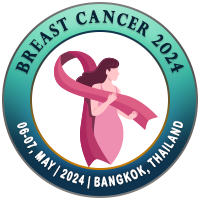
Margaret I Fitch
University of Toronto, CanadaTitle: Understanding Cancer Survivorship: Transitioning to Life after Cancer Treatment
Abstract
Introduction
The number of cancer survivors continues to grow It is expected to more than double in the next 20 years because of improvements in screening and treatment of the disease as well as population growth. In Canada alone, this number already reached 2.1 million in 2018 (most recent poll). For many, the aftermath of cancer treatment leaves them with physical, emotional, and practical consequences. Understanding the experiences these survivors undergo is important if health care professionals are going to be able to plan and provide relevant survivorship care approaches.
Methods
A national survey was distributed across the ten Canadian provinces to capture the experiences of Cancer Survivors 1-3 years following treatment. The survey assessed physical, emotional and practical changes and whether survivors were able to access help for their difficulties in coping with these consequences. The survey facilitated both quantitative and qualitative analyses.
Results
A total of 13, 319 cancer survivors responded to the survey. Breast, prostate, and colorectal cancer accounted for the majority of diagnoses and more than 80% were 55 years of age or older; approximately 67% were also living with co-morbidities. The most frequent physical changes were fatigue (68%) and sexual activity (45%) changes while anxiety (68%) and depression (46%) accounted for the most frequent emotional changes. Issues of return to work (23%), transport (22%), and finances (21%) accounted for the most frequently identified practical issues. Across all changes, individuals flagged concerns and challenges to various degrees in obtaining relevant assistance for their concerns. Many did not seek-help because they had been told it was normal to experiences these changes or thinking there was nothing that could be done to offset the issue.
Conclusion
Cancer treatment can leave individuals with on-going consequences that influence their daily living. Providing relevant assistance for the survivor concerns will require intentional planning and implementation of tailored programming.
Biography
Margaret I Fitch, RN PhD, is a Professor (Adjunct) at the Bloomberg Faculty of Nursing, University of Toronto, in Canada. She has a background in oncology nursing and psychosocial oncology, including palliative care, practicing for over 20 years at the Odette Cancer Centre in Toronto. She held the positions of Head of Oncology Nursing and Psychosocial Oncology, and Co-Director of the Psychosocial and Behavioral Oncology Research Unit.
Her long-term research focus has been on coping and adaptation of patients/survivors and families across the cancer trajectory. Advocacy for patient and stakeholder engagement has been a specific interest. Psychosocial care along the cancer trajectory and survivorship are the broad foci for her research work and teaching.
Dr. Fitch currently serves as Editor-in-Chief of the Canadian Oncology Nursing Journal and is on the Board of Directors with the Canadian Association of Nurses in Oncology.

